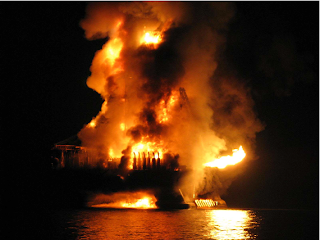Financial Times Believes that President Obama’s Speech Should Have Emphasized Natural Gas. I Disagree.
Kate Mackenzie, who writes for the Financial Times excellent blog about energy called FT Energy Source (free registration required), published a reaction to President Obama’s June 15, 2010 Oval Office speech about energy. Her piece was titled Obama’s big oil spill speech: An opportunity only half-seized. She was apparently looking for specific actions that would be taken, even though the details of how a complex society powers itself cannot be directed in a single speech. Here is a quote from her reaction:
Tough words but they would have had more impact if backed up by demands for a specific course of action. Those who follow the oil industry believe it will be decades before renewables can have any meaningful impact. They urge aggressive energy efficiency measures as the fastest way to reduce carbon emissions. And also the use of natural gas wherever possible.
The US has abundant gas resources, thanks to new technology enabling it to be extracted from shale rock. And the country already has the infrastructure across the country to move and use gas. Natural gas is about 30 per cent less carbon intensive than oil and 50 per cent less than coal. But E. Russell (Rusty) Braziel, Managing Director of BENTEK Energy, which provides natural gas market analysis, said in an interview it is still a fossil fuel:
“All fossil fuels tend to get tarred with the same brush.”
That particular section begged for a comment. Whenever people look at the well known tragedies that have occurred in the fossil fuel industry in the eastern United States during the first half of 2010 and then proclaim that the solution is more natural gas, I react in the same way as the music expert in the famous Saturday Night Live skit who demanded “more cowbell”.
Natural gas is certainly NOT a solution that will help us to avoid dangerous events like the Massey Upper Big Branch coal mine explosion, the Deepwater Horizon well explosion or the Kleen Energy Plant explosion (that is one that many forget.) In fact, “clean natural gas” was the material that accumulated in dangerous concentrations, got sparked by something, and then exploded and burned in each one of those fatal accidents. Here is the comment that I added to the FT Energy Source blog post:
Your emphasis on natural gas as an alternative energy source is interesting. Are you aware of the fact that the actual cause of both the Deepwater Horizon explosion and the Massey Energy mine explosion was an uncontrolled accumulation of “clean natural gas”? The word for that substance that is used more by engineers and scientists who are not selling a product is “methane”. They also use the chemical symbol notation of CH4.
We should all know that methane (aka clean natural gas) is explosive, flammable, and requires storage under high pressure in order to even approach the energy density of gasoline. Even with high pressure tanks, it takes up significantly more space in a vehicle propulsion system and is generally not appropriate for use as a fuel on long distance vehicles like trains or ships that would be more economical if they use their space for hauling cargo and passengers instead of just carrying fuel.
Natural gas also has the disadvantage of coming from almost exactly the same places as other petroleum products and being supplied by exactly the same companies. BP is a huge gas supplier; ExxonMobil produces and sells as much natural gas energy (in barrels of oil equivalent) as it does oil energy.
Finally, that abundant gas resource that you mention will last the US about 100 years IF (and only if) we do not increase the rate at which we consume the fuel AND IF we count all proven, probable, possible and speculative resources and expect that they can all be produced when we want them to be produced. Our infrastructure is not complete – there are few pipelines and gas processing stations that collect, process and distribute gas from places like the Marcellus Shale or from coal bed methane sources in Colorado, Utah and Wyoming.
There is a reason that all fossil fuels are tarred with the same brush – they are all simply variations on a theme of being dependent on hydrocarbons that have roughly similar properties.
If you really want to reduce dependence on hydrocarbons and introduce more energy choices, you need to consider the fact that nuclear fission has proven that it can provide reliable power from a very compact source of fuel that can last an aircraft carrier for 20+ years and a submarine for more than 30 years. A few truckloads of uranium can provide emission free power to a city of one million for 18 months.
The safety record of using atomic fission is impressive. There have been fewer injuries and deaths in 50 years of using fission than in the first 6 months of 2010 from fossil fuels.


The Chemical Safety Board’s web site has some information on Kleen Energy and some other accidents caused by venting methane. I do find this statement by the CSB chairman fascinating: “Venting any significant amount of natural gas into a workplace is an open invitation to disaster.” As good as radiation safety officers usually are at giving obvious warnings, I don’t think any of them could say that with a straight face. Yet evidently it’s a warning that is actually needed.